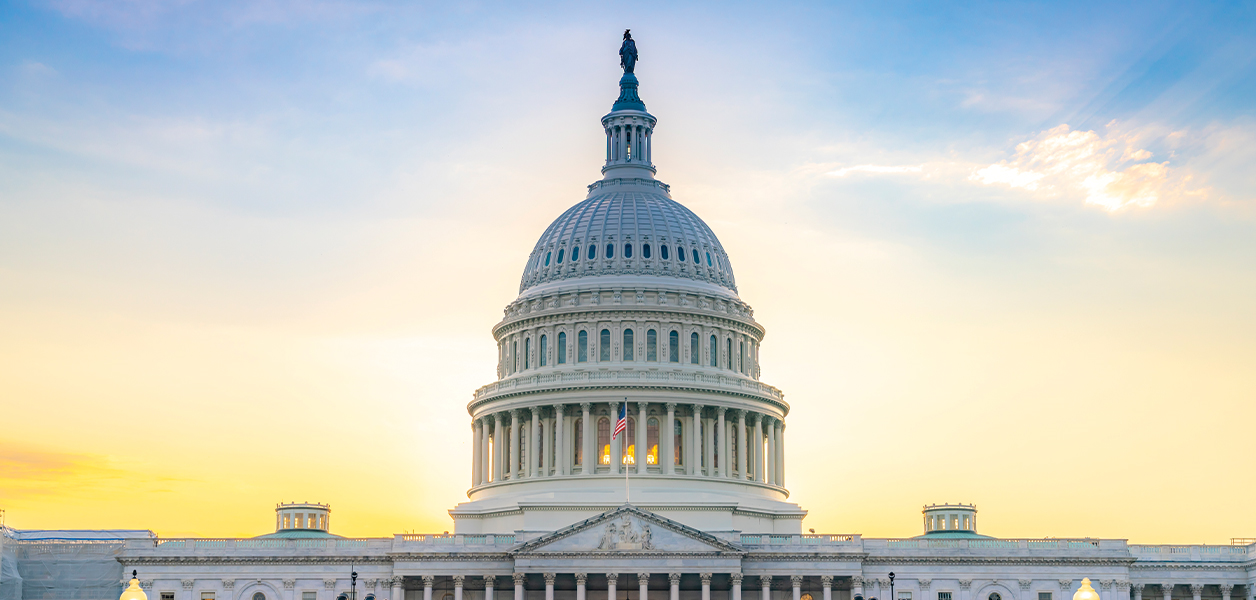Roofing Day in D.C. 2025 had record attendance as roofing professionals advocated for industry issues
On April 8-9, roofing professionals from throughout the U.S. gathered in Washington, D.C., to advocate with one voice in support of pro-growth tax reform and solutions to workforce challenges. More than 260 attendees met with members of Congress and congressional staff from about 180 offices to share must-haves for the upcoming tax bill and ways we can get more participants interested in the fulfilling work of our industry. A special thank you to our sponsors for making this event a huge success! To learn more information about the only advocacy event dedicated solely to the roofing industry, visit www.nrca.net/roofingday.
Congress passes budget resolution, paving the way for tax and spending reform
On April 10, the House passed FY25 Concurrent Budget Resolution as amended by the Senate to pave the way for tax and spending reform legislation that can be passed by a simple majority in both congressional chambers. Significant differences remain regarding the details of future legislation enabled by the resolution, but we expect to see the majority of expiring 2017 tax provisions—such as the 199A qualified business income deduction for pass-through entities—be extended or made permanent within this framework. The resolution also provides for significant increases in funding for President Trump’s border security and immigration enforcement initiatives.
For example, the Senate resolution calls for lifting the debt ceiling by $5 trillion, whereas the House would raise it by $4 trillion. With respect to spending, the House plan would reduce spending by at least $1.5 trillion, and almost two-thirds of that could come from Medicaid. The Senate's plan includes only nominal cuts with assurances from Senate Republican leaders that the actual amounts would be in range of the House targets. Congress hopes to come to an agreement regarding negotiation on overall spending, as well as each provision to be included within this legislation, and then pass the bill by Memorial Day. However, summer may be a more realistic goal based on challenges ahead.
NRCA submits comments to EPA regarding prioritization of vinyl chloride under Toxic Substances Control Act
On April 2, NRCA joined with industry leaders in submitting comments regarding the scope of the Environmental Protection Agency’s consideration of prioritization (and ultimately further regulation or ban) of vinyl chloride (and PVC) under the Toxic Substances Control Act. NRCA also recently joined the Vinyl Chloride Alliance Coalition to collaborate with an aligned approach to activating industry stakeholders for submitting feedback to EPA at each step of the process.
In recent years, NRCA worked with industry partners to successfully push back against an effort by the Center for Biological Diversity to convince the EPA to designate discarded PVC as hazardous waste, which ultimately was denied by the EPA. We hope to continue this effort to engage and inform our government to help make the best policy decisions for business and the environment.
President Trump lowers minimum wage for federal contractors
President Trump has issued an Executive Order that rescinded a number of actions taken by the Biden administration, including the requirement to pay individuals working in connection with certain federal contracts and subcontracts a minimum wage currently set at $17.75 per hour. Once the Executive Order is implemented, it is expected to lower the minimum wage for federal contractors to $13.30 per hour. The change will take effect when the Department of Labor issues interim guidance or updates its regulations, although DOL’s website says it no longer will enforce the $17.75 rate.
Court reverses DHS termination of Temporary Protected Status for Venezuela
On March 31, a federal district court issued a nationwide injunction that reverses, at least temporarily, a Feb. 5 decision by the Department of Homeland Security that vacated the extension of Temporary Protected Status for qualifying individuals from Venezuela, which had been issued by the Biden administration Jan. 17. Before the issuance of the injunction, TPS holders under a 2021 determination were scheduled to have their status expire Sept. 10, 2025, whereas TPS holders under a determination made in 2023 were scheduled to have their status expire April 7, 2025. The court injunction puts the Feb. 5 decision on hold until final adjudication by the court, so the original extension—including the availability of Employment Authorization Documents—is reinstated until Oct. 2, 2026, pending further litigation. It is expected DHS will appeal this court decision, so it is possible the status of Venezuelan TPS holders could change again. More information is available on the U.S. Citizenship and Immigration Services website.
NRCA members advised to plan for all contingencies as Trump tariff policy evolves
During President Trump’s campaign, he frequently promised to levy tariffs of 10% to 20% on all U.S. trading partners and 60% on China. This month, many of these promises have come to fruition, and more announcements, changes and exceptions are anticipated. To this end, we compiled some helpful tariff trackers, which can be found at the International Trade Administration, Reed Smith and Global Business Alliance.
During this dynamic period of uncertainty, companies should take proactive steps to advance and protect their interests. For example, businesses should understand imports they rely on and their countries of origin; assess a range of potential effects on key suppliers and materials; and monitor the administration’s process for opportunities to provide analysis and data to inform the development of trade policy and potential alternatives.




